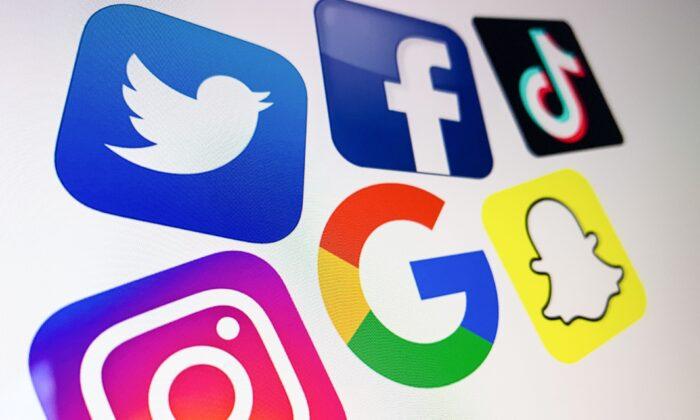The U.S. government needs to bury the hatchet with Big Tech and harvest the innovation of firms such as Google, Apple, and Facebook so that the West can better compete with Beijing’s rapid technological advancements, according to a visiting Australian senator.
Australian Sen. James Paterson, of the centre-right Liberal Party and now-shadow minister for countering foreign interference, said the great power struggle in the 21st Century would be marked by “technological battlegrounds,” such as artificial intelligence (AI), semiconductors, 5G, quantum computing, and green tech.
Paterson said that while politicians will “never go out of business beating up on Big Tech,” legislators should look toward the “bigger strategic picture.”
“I am asking my parliamentary colleagues to lift their eyes from much more day-to-day and conventional domestic challenges posed by Big Tech to the horizon to contemplate the systemic risks we all face if they fail,” he told the American Enterprise Institute in Washington on Sept. 13.
“An indispensable part of the strategy to win the tech race in an age of strategic competition is a new compact with Big Tech. Nothing less than the survival of liberal democracies and the free enterprise system depends on it.”
Paterson said governments don’t have the resources, scale, and appetite for risk that tech giants such as Amazon or Intel have.
Technological Leaps and Bounds
The senator warned that while the Soviet Union ultimately couldn’t match the full range of U.S. innovation, the Chinese Communist Party was a different beast.“China has emerged as a full-spectrum competitor, with [Chinese leader] Xi Jinping declaring the battle for global technological superiority will be ‘fierce,’” Paterson said. “Based on current trends, it is projected that China will overtake America in five to 10 years.”
He noted that China’s spending on research and development was nearly 90 percent of that of the United States and also cited former Air Force Chief Software Officer Nicolas Chaillan, who said China’s victory in the field of AI was “already a done deal.”
“The dual-use applications of AI are broad and could transform operations in financial, political, and military fields,” Paterson said.
Beijing has supplied AI surveillance technology to 63 countries.
The senator also referenced research from Jonathan Dowling, a physics professor at Louisiana State University, who predicted China’s communications network could “go black” in a few years, effectively blocking U.S. intelligence from being able to monitor it.
“Quantum sensing could nullify stealth craft and radar jamming, and quantum computing could calculate highly complex equations and simulations in seconds,” Paterson said.
China’s Baidu recently revealed that it was developing its own quantum computer to compete with the United States. Thus far, Arthur Herman, a senior fellow at the conservative think tank Hudson Institute, said the United States was still far ahead in this field but warned of the need for vigilance.
Winning Over the Global Order
Paterson also said the response to the Ukraine war demonstrated the willingness of Western tech firms to pick sides and back governments.For example, Microsoft worked closely with the Ukrainian government to provide 24/7 intelligence sharing and deploy defences against cyberattacks. At the same time, Google’s Project Shield has also been involved in similar initiatives.
Amazon Web Services helped migrate Ukrainian government services and data onto the Cloud to preserve information in case physical servers were destroyed, and Ukrainian forces used Elon Musk’s Starlink satellite to control drones to drop bombs on enemy targets.
“Many Western tech companies have fought to keep the internet accessible to the Russian people to counter Russia’s attempts ’to raise a digital iron curtain,'” Paterson said. “But we must have the same expectation of Big Tech when it comes to potential scenarios in the Indo-Pacific. They must pick a side. And it must be ours.”
He said “swing states” that are happy to fence-sit between democracies and Beijing will work with partners with the cheapest and best technology. But he said that if China was better at meeting their needs, it would make the world a “much less safer place.”
“Despite our many legitimate frustrations with our own tech titans, we do have to choose ourselves whether we want them to prevail in their own competition with their counterparts in authoritarian countries,” Paterson said. “Because it will either be Google, Facebook, Microsoft, and Amazon who set the international rules of the road when it comes to technology, or it will be Tencent, ByteDance, Huawei, and HikVision.”





